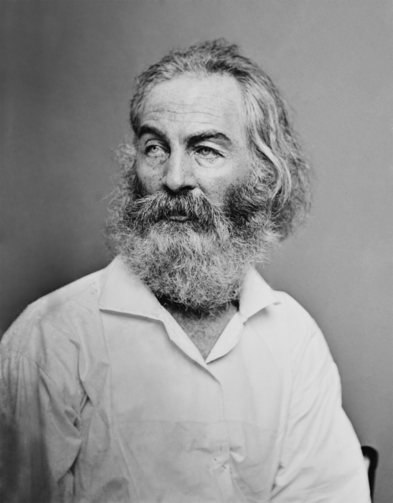Life doesn’t come with lines. We draw those ourselves. Of course, without them, the world would be so blurred as to lack definition, though the danger is drawing lines that divide without purpose. Whatever their original intention, they can leave us detached from others, who then appear as aliens, as threats, like the leper whom Jesus heals. Lepers were quarantined. They weren’t simply contagious. They were thought morally accursed.
Here’s another example of crossing a line to show compassion. George had been wounded. His mother in Brooklyn withdrew fifty dollars in savings, so that Walt, his older brother, could go to his aid. In the American Civil War, one was as almost as likely to die from medical care as on the battlefield. Fortunately, George wasn’t badly hurt. After visiting him, his brother learned that two other Brooklyn boys were in a Washington Hospital. He decided to visit them as well. Their families would surely be grateful for news.
At Campbell Hospital, walking through a ward filled with beds, Walt stopped before that of a complete stranger. In Rebel Souls (2014) Justin Martin writes:
That’s how Walt Whitman became, as he later put it, “The Soldier’s Missionary.” He didn’t preach to the wounded soldiers, though he would gladly read the Bible to them, if it brought comfort. He’d read anything they wanted, especially letters from home. He would then help to pen a response. In fact, Walt
Like Jesus and the leper, Walt Whitman crossed a line, one that had divided him from those in need of compassion.
Perhaps an objection is forming: Whitman was attracted to young men, so his motives lacked purity. Yes, but the world would know precious little of charity and care if it were only extended by the utterly disinterested. As easy as it is to draw lines between people, it’s rather hard to demarcate disinterestedness in ourselves.
Perhaps another objection: those soldiers suffered for a noble cause! It was their physical wounds, not their moral shortcomings, which had separated them from the healthy and the heedless. Yes, but if sin should be the line that divides—and it surely does. It’s in the very nature of sin to divide—where do we draw that line? Between myself and the sinner? But what sort of blindness—save sin itself—would lead me to conclude that between me and the alienated one—the homosexual, the illegal immigrant, the unwed mother on welfare, the adherent of another faith—there lays a line separating sin from sanctity? No one sets out to sin, to become the alien. Yet it happens to all of us, because it is in the nature of sin to divide, to separate us from our fellows, even from our truest selves.
We draw lines, but sin isn’t something that can be contained by them. It scatters within the soul as surely as it does without. It can make ignorance and prejudice look saintly. Sin can’t be circumscribed. It can only be redeemed, and by a savior who summons all to himself.
From Martin’s Rebel Souls,
Erastus Haskell didn’t die alone or forgotten, because Walt Whitman, like Jesus, crossed a line to show compassion. Life doesn’t come with lines. We draw them. Hopefully, very carefully.
Leviticus 13: 1-2, 44-46 1 Corinthians 10:31-11:1 Mark 1: 40-45








